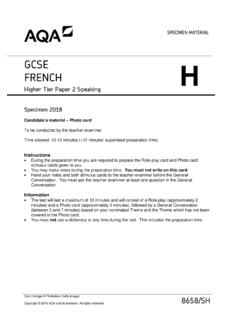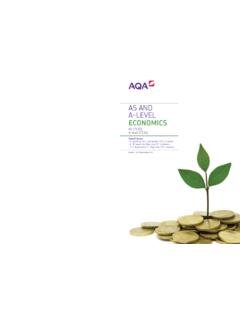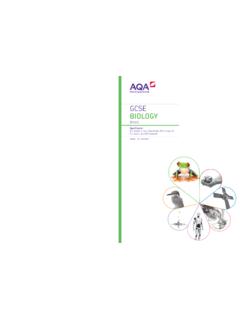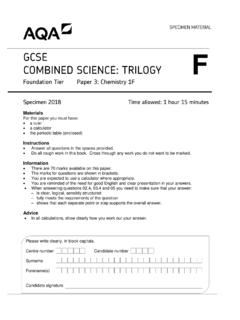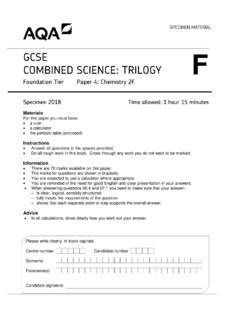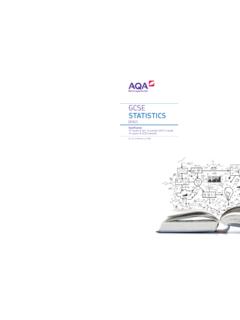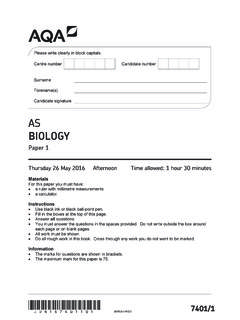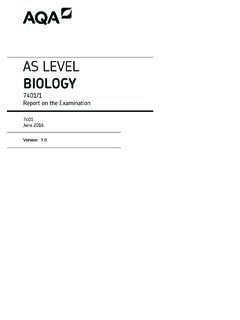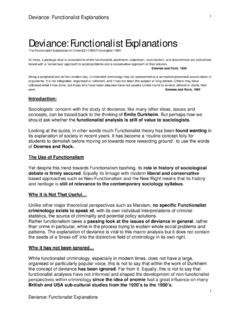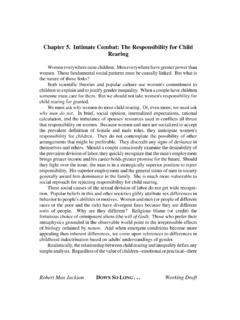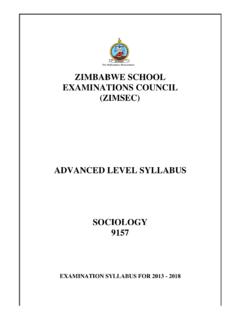Transcription of Get help and support GCSE SOCIOLOGY - filestore.aqa.org.uk
1 Help and supportVisit our website for information, guidance, support and resources at can talk directly to the SOCIOLOGY subject teamE: 01483 477 822 Copyright 2016 AQA and its licensors. All rights retains the copyright on all its publications, including the specifications. However, schools and colleges registered with AQA are permitted to copy material from this specification for their own internal Education (AQA) is a registered charity (number 1073334) and a company limited by guarantee registered in England and Wales (company number 3644723). Our registered address is AQA, Devas Street, Manchester M15 (8192)SpecificationFor teaching from September 2017 onwardsFor exams in 2019 onwardsVersion 2 December 20163 GCSE SOCIOLOGY (8192). For exams 2019 onwards.
2 Version for the most up-to-date specification, resources, support and administrationContents1 Introduction Why choose AQA for GCSE SOCIOLOGY support and resources to help you teach 52 Specification at a glance Subject content Assessments 73 Subject content The sociological approach Social structures, social processes and social issues Families Education Crime and deviance Social stratification Sociological research methods 164 Scheme of assessment Aims and learning outcomes Assessment objectives Assessment weightings 185 General administration Entries and codes Overlaps with other qualifications Awarding grades and reporting results Re-sits and shelf life Previous learning and prerequisites Access to assessment: diversity and inclusion Working with AQA for the first time Private candidates 216 Appendix A: key terms and concepts Families Education Crime and deviance Social stratification 347 Appendix B.
3 Texts and summaries Families Education Crime and deviance Social stratification 464 Visit for the most up-to-date specification, resources, support and administrationAre you using the latest version of this specification? You will always find the most up-to-date version of this specification on our website at We will write to you if there are significant changes to this SOCIOLOGY (8192). For exams 2019 onwards. Version for the most up-to-date specification, resources, support and administration1 Why choose AQA for GCSE SociologyGCSE SOCIOLOGY helps students to gain knowledge and understanding of key social structures, processes and issues through the study of families, education, crime and deviance and social will develop their analytical, assimilation and communication skills by comparing and contrasting perspectives on a variety of social issues, constructing reasoned arguments, making substantiated judgements and drawing reasoned studying SOCIOLOGY , students will develop transferable skills including how to.
4 Investigate facts and make deductions develop opinions and new ideas on social issues analyse and better understand the social can find out about all our SOCIOLOGY qualifications at specification designed for you and your studentsStudents study key ideas of classical sociologists including Durkheim, Marx and Weber, referencing their view of the world and their contribution to the development of the will also learn how to apply various research methods to different sociological contexts. They will be introduced to sociological terms and concepts concerned with social structures, social processes and social , well structured exams, accessible for allTo enable your students to show their breadth of knowledge and understanding, we ve created a simple and straightforward structure and layout for our papers, using a mixture of question more information on our exciting new GCSE SOCIOLOGY qualification, visit support and resources to help you teachWe ve worked with experienced teachers to provide you with a range of resources that will help you confidently plan, teach and prepare for resourcesVisit to see all our teaching resources.
5 They include: sample schemes of work to help you plan your course with confidence training courses to help you deliver AQA SOCIOLOGY qualifications subject expertise courses for all teachers, from newly qualified teachers who are just getting started to experienced teachers looking for fresh for the most up-to-date specification, resources, support and administrationPreparing for examsVisit for everything you need to prepare for our exams, including: past papers, mark schemes and examiners reports specimen papers and mark schemes for new courses Exampro: a searchable bank of past AQA exam questions example student answers with examiner your students' results with Enhanced Results Analysis (ERA)Find out which questions were the most challenging, how the results compare to previous years and where your students need to improve.
6 ERA, our free online results analysis tool, will help you see where to focus your teaching. Register at information about results, including maintaining standards over time, grade boundaries and our post-results services, visit your skills up-to-date with professional developmentWherever you are in your career, there s always something new to learn. As well as subject specific training, we offer a range of courses to help boost your skills. Improve your teaching skills in areas including differentiation, teaching literacy and meeting Ofsted requirements. Prepare for a new role with our leadership and management can attend a course at venues around the country, in your school or online whatever suits your needs and availability. Find out more at and supportVisit our website for information, guidance, support and resources at you'd like us to share news and information about this qualification, sign up for emails and updates at , you can call or email our subject team : 01483 477 8227 GCSE SOCIOLOGY (8192).
7 For exams 2019 onwards. Version for the most up-to-date specification, resources, support and administration2 Specification at a glanceThis qualification is linear. Linear means that students will sit all their exams at the end of the Subject content1 The sociological approach (page 8)2 Social structures, social processes and social issues (page 8)3 Families (page 9)4 Education (page 11)5 Crime and deviance (page 12)6 Social stratification (page 14)7 Sociological research methods (page 16) AssessmentsPaper 1: The SOCIOLOGY of families and educationWhat's assessed The SOCIOLOGY of families The SOCIOLOGY of education Relevant areas of social theory and methodologyStudents will be expected to draw on knowledge and understanding of the entire course of study to show a deeper understanding of these it's assessed Written exam.
8 1 hour 45 minutes 100 marks 50% of GCSEQ uestions Section A has two multiple choice questions followed by a range of short and extended responses. Section B has two multiple choice questions followed by a range of short and extended responses. Paper 2: The SOCIOLOGY of crime and deviance and social stratificationWhat's assessed The SOCIOLOGY of crime and deviance The SOCIOLOGY of social stratification Relevant areas of social theory and methodologyStudents will be expected to draw on knowledge and understanding of the entire course of study to show a deeper understanding of these it's assessed Written exam: 1 hour 45 minutes 100 marks 50% of GCSEQ uestions Section A has two multiple choice questions followed by a range of short and extended responses.
9 Section B has two multiple choice questions followed by a range of short and extended responses.+8 Visit for the most up-to-date specification, resources, support and administration3 Subject contentThis specification requires students to: draw on information and evidence from different sources and demonstrate the ability to synthesise them analyse and evaluate different research methods used in sociological investigations and assess, critically, the appropriateness of their use analyse and evaluate information and evidence presented in different written, visual and numerical forms apply their understanding to explore and debate the current sociological issues outlined in each of the topic areas use sociological theories and evidence to compare and contrast social issues, construct reasoned arguments and debates.
10 Make substantiated judgements and draw conclusions draw connections between the different topic areas The sociological approachAll the content is set in a United Kingdom (UK) context except where otherwise must know and understand: debates within SOCIOLOGY including conflict versus consensus how sociological knowledge and ideas change over time and how these ideas inform our understanding of the social world the contextualised work (a sense of time and place) of key classical sociologists Durkheim, Marx and Weber referencing both their view of the world and their contribution to the development of the discipline different sociological perspectives on social structures, social processes and social issues, including those informed by: feminism, functionalism, interactionism and Marxism as specified in the topics listed below and key arguments (identified through reading and responding to extracts from key sociological texts) the interrelationship between the core areas of SOCIOLOGY how to use sociological research methods as outlined in the topics and how they apply in the specified contexts ie families, education, crime and deviance, social stratification.
